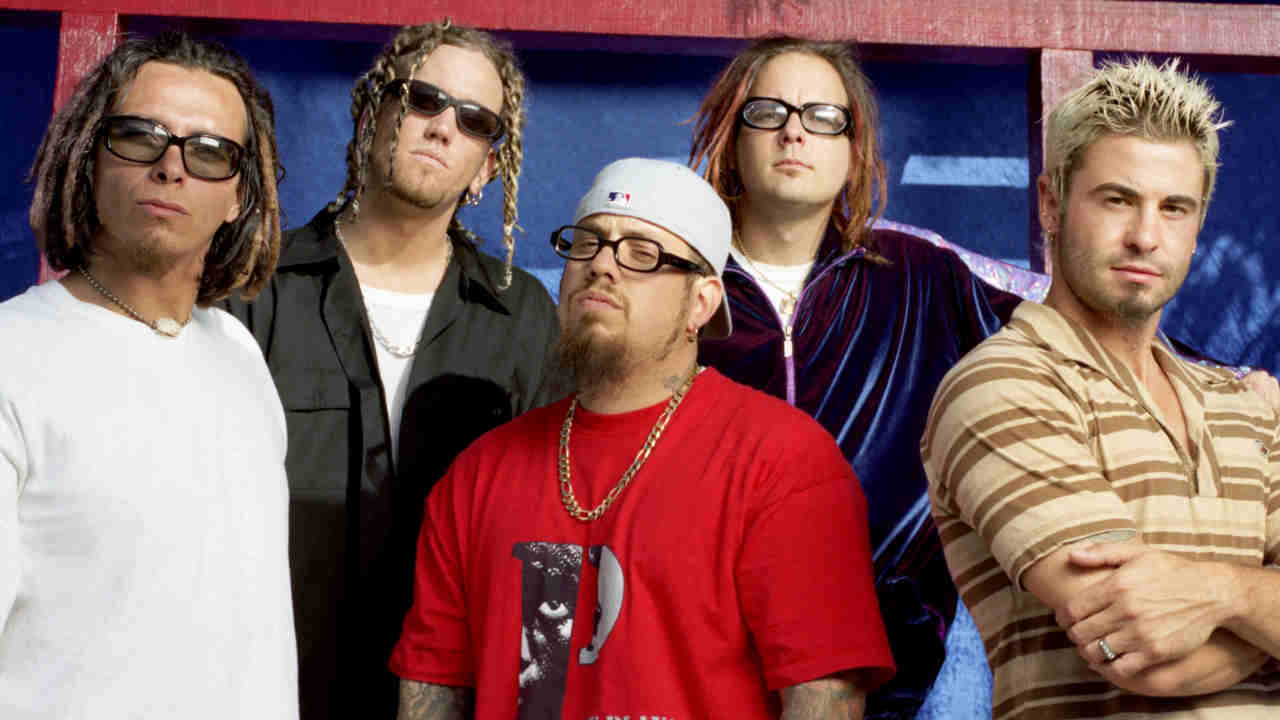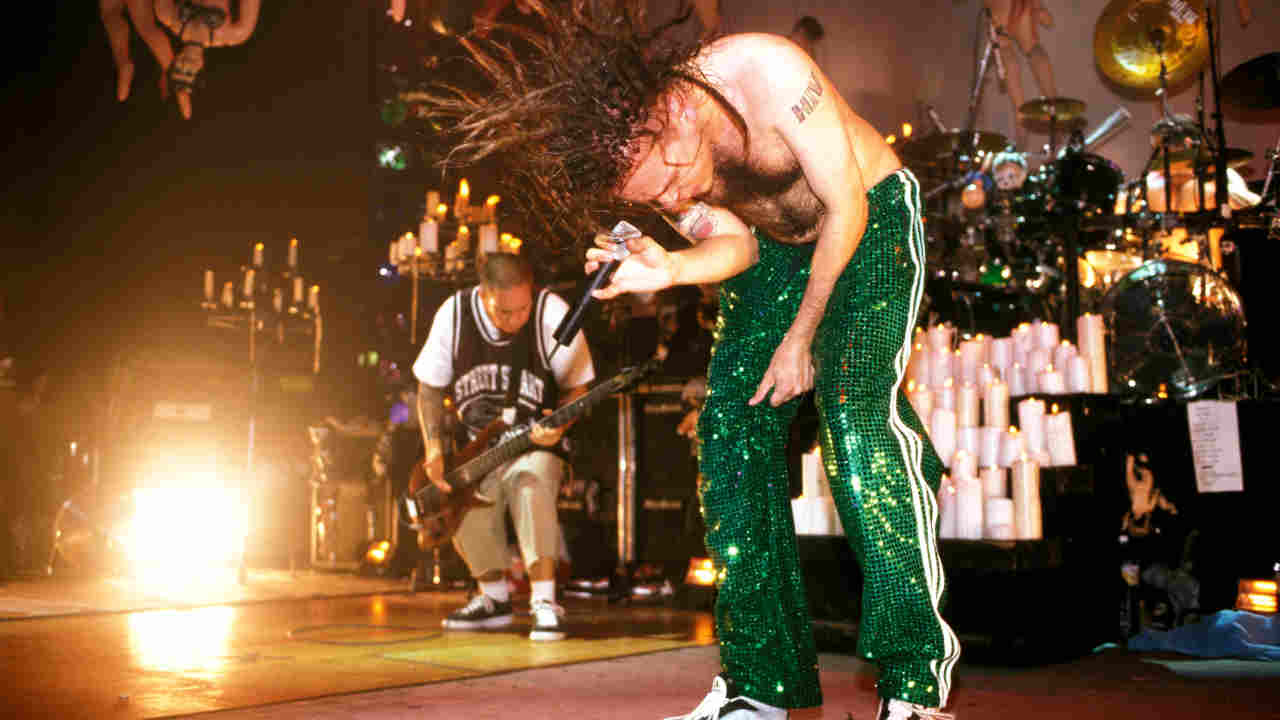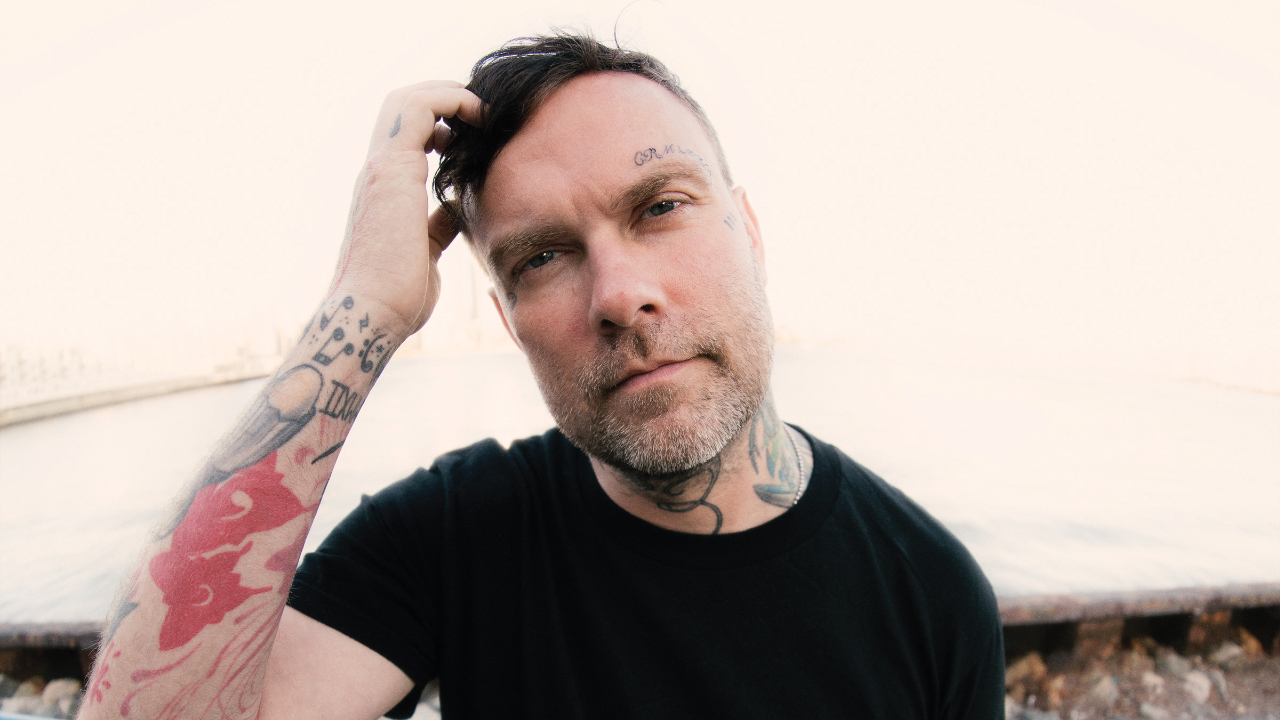“We blew this whole scene open, I don’t care what anybody says. We did all the work, and now all these other bands are popping up”: How Korn changed up their sound and left the copycats behind with Follow The Leader
Korn’s 1998 album Follow The Leader was the sound of the nu metal pioneers pulling away from the competition

Nu metal founding fathers Korn can legitimately lay claim to kickstarting a whole new scene with their landmark 1994 debut album, but follow up Life Is Peachy was a disappointment by contrast. Which meant a lot was riding on 1998’s Follow The Leader, as Metal Hammer found out when we met vibed-up singer Jonathan Davis and guitarist Munky in Paris just before the album was released.

The Costes Hotel, situated bang in the centre of one of Paris’s more upmarket districts, is, if not the height of luxury, then at least of a sufficient altitude to induce pretty severe vertigo. A once-over of the clientele lunching out in the terrace restaurant reveals an impeccably turned out David Ginola, doubtless gathering his thoughts for his next piercing insight as part of the BBC’s World Cup pundit panel, the ever-suave Johnny Depp and an assorted collection of Armani’d up nouveau riche.
In their midst sits a tallish fella with hair like matted straw, decked head to toe in casual sports gear, hunched low over a plate of mozzarella and tomatoes, enthusing in a slightly whiny American accent about the quality of French food. His companion, slightly tanned and sporting chunkier, neater dreads, but looking no more healthy than the first, grunts in acknowledgement, while toying with his multi-storey club sandwich. As the French chattering classes get at one with their déjeuner, you can’t help but wonder what they make of Korn’s Jonathan Davis and James ‘Munky’ Shaffer, enjoying one of the many fringe benefits of being multi-platinum-selling rock stars.
Hammer is in Paris to chat to Korn about their impending new album Follow The Leader, by their own admission the most important of their career to date, but there’s one small problem: we haven’t heard it yet. Or at least, not all of it. However, if the five tracks we have been privy to are anything to go by, then Follow The Leader will be a stormer, the true follow-up to the jaw-dropping headfuck that was their eponymous debut – as opposed to the disappointing second album Life Is Peachy. This, Korn fans, is the real deal.
“This could be the one, this could be it for us,” speculates Jonathan Davis over a wake-up call Jack Daniels and Coke. “This is the album that makes of breaks your career. If the third album does well then you’re set for life.
“I’m stressed out at the fact that it’s that good,” adds the frontman, and it’s a good thing too, because once the dust on Life Is Peachy had settled, the considered opinion was that it was, well, arse. After the ground-breaking debut, to be presented with such a similar, and thus ultimately redundant, record was a massive disappointment, which the critics ultimately turned on. Fortunately, Korn know this too.

“Well, yeah, we knew, it was obvious. We know that album sucked,” admits Jonathan, before going on to qualify this statement with: “Well it didn’t suck, there’s good songs on there, but we know we rushed it. We were really upset with the last album. It was awesome, but it could’ve been better. We settled.
Metal Hammer Newsletter
Sign up below to get the latest from Metal Hammer, plus exclusive special offers, direct to your inbox!
“Life Is Peachy is all at one tempo, it’s all the same,” Jonathan continues. “On Follow The Leader, we’ve got a lot of weird things going on, a lot of variety.”
Indeed, across the five tracks we’ve heard, there’s more experimentation and variety than on the whole of Korn’s recorded output to date – probable first single Got The Life grinds away to a disco beat, for fuck’s sake! That extends to lyrical themes as well. Gone are the well-documented childhood stories and anxieties; Follow The Leader is the album on which Jonathan Davis grows up. Well, sort of.
“This is my album of self-destruction. There’s none of my childhood stuff going on any more. This is more about me dealing with pressures I put on myself,” he explains, twisting his dreadlocks frantically, as he is wont to do when talking about himself.
“The self-destruction I’m going though, killing myself and doing all the fucked-up things I do just to deal with it. The pressure of what it’s like to be in this band, of being a father, all kinds of shit.”
Parenthood is a big thing with Korn at the moment, four out of the five members either being fathers or due to be any minute. Are they getting to a point where families take priority?
“This is what we love to do – I don’t care if I have a kid, it doesn’t have to stop me doing what I do and what I love,” Jonathan snorts.
How about the partying that goes hand in hand with being in a successful band, though? Are you going to stop doing that?
“Nah, fuck that. I’m schizo, I have two personalities: I’m a dad when I come home, but once I’m out that door, I’m totally changed – within reason. I’m not gonna go fucking kill myself, ’cos I want to be there for Nathan, but I never have any guilt that I have a wife and kid at home and I can’t party – fuck that! I work my ass off, I’m making money and I fucking need to party or I’ll go crazy.”
So if, as previously claimed, the songs on the first two albums were intended as personal therapy, has it worked at all?
“Everybody always has problems, new ones just seem to pop up,” Jonathan answers, twisting on his dreadlocks. “I need to go out and sing those songs again – I haven’t sung in a year and I’m more fucked up than ever.”
And what are the pressures of being in Korn?
“I can’t begin to tell you. It’s stuff you bring on yourself as artists. It’s our third album and we’re scared whether people will like it or not, the shit we went through with producers… it just wracks your brain.”
“The shit we went through with producers” refers to the tortuous problems Korn experienced during their protracted stint in the studio. While it’s true that after their experience with Life Is Peachy, the band wanted to take more time on this album, a major factor contributing to the nine months they spent hold up recording was the breakdown of any sort of working relationship with original producer Steve Thompson.
“He took us to the level that we needed to be at and then we didn’t need him any more,” sniffs Munky.

“Yeah, get out!” hoots Jonathan. “We started bumping heads in the studio. Once we got into the studio, things started to change. We’d do our beats or something that we thought was best and we’d leave that and then I’d come in and he’d changed it! Without telling us! He’d be like, ‘That grooves,’ and we were like, ‘No! Put it back!’ He puts it back, we come back in later and he’s changed it again. We were like, ‘You know what, man? Get out. It’s time for you to go.’ He didn’t have the same vision that we had for our album – he wanted to make it all… just not us.”
So out went Steve and in came… Ross Robinson, the man Korn were adamant they didn’t need any more. “He didn’t produce anything on the album, he was just there as my cheerleader,” says Jonathan, twisting away like Chubby Checker.
“I love Ross to death and working without him was a big awakening for me – it was like me jumping out of a cocoon, because I really didn’t have that much self-confidence in myself. Working with Ross, he’d keep trying to take me back to those first two albums, but I didn’t want to go there, and he’d be adamant about it and it pissed me off. Finally I got to the point where I thought, ‘I don’t need Ross, I don’t need anybody.’
The concept behind Follow The Leader refers to the oft-forgotten fact that when Korn broke back in 1995, they tore a Godzilla-sized hole through a metal scene wandering aimlessly in a post-grunge wilderness. Of course, since then, innumerable bands have followed them through, many of them clinging to Jonathan Davis and co.’s coat-tails for all they’re worth.
“We blew this whole scene open, I don’t care what anybody says,” states the frontman bullishly. “We did all the work, and now there’s this new market, all these Korn bands are popping up.”
“Which is flattering,” nods Munky.
“Which is totally awesome, ’cos we created a new scene. It’s like when Nirvana came in and the grunge scene happened, it’s happening now with this new music. It’s flattering and everything but we were just throwing that out there. Some of the magazines I’ve looked at even have a Korn section for all these different bands that sound just like us. That’s fucking awesome, I see something happening.”
The flipside is that you’ve now practically killed metal stone dead – now everybody takes the easy option and tags the Korn sound for instant success.
“Yeah, but we will always be one step above them,” grins Munky knowingly. “Just when they start to nail the sound of our first two records, bands going, ‘Oh, we’ve got what they’re doing figured out now,’ now this record comes out and they’re gonna be like, ‘Man…’ We’re one step ahead.”
And then there are the bands Korn have dragged through kicking and screaming themselves, like Limp Bizkit and Deftones. “We liked helping those bands out,” smiles Jonathan before changing tone (twist, twist). “Deftones is a big misconception – we don’t even talk to them now. We’re pissed off with them. They talked some stuff about us. Korn and Deftones were out at the same time and we used to be really good friends, but now all this shit has torn us apart. It’s sad. From the media saying that they sound like Korn, I don’t hear anything similar at all. I think they’ve got totally sick of it and have shut us off completely, Chino especially.”
Well, the rules for friendship change when you start counting your album sales in millions.
“People start changing and tripping out, expecting us to change. We treat ’em the same, but people take the shit so fucking personally. We don’t have very many friends. I have four of my best friends in my band and then these other bands… success starts changing them, you start changing, jealousy comes into play and then they’re gone. It sucks.”
And for the record, where do you stand on the Coal Chamber issue?
“I’m not going to go there,” is the deliberate response, before a smile cracks out. “You fucking British fucking press motherfuckers!”
Originally published in Metal Hammer in June 1998


